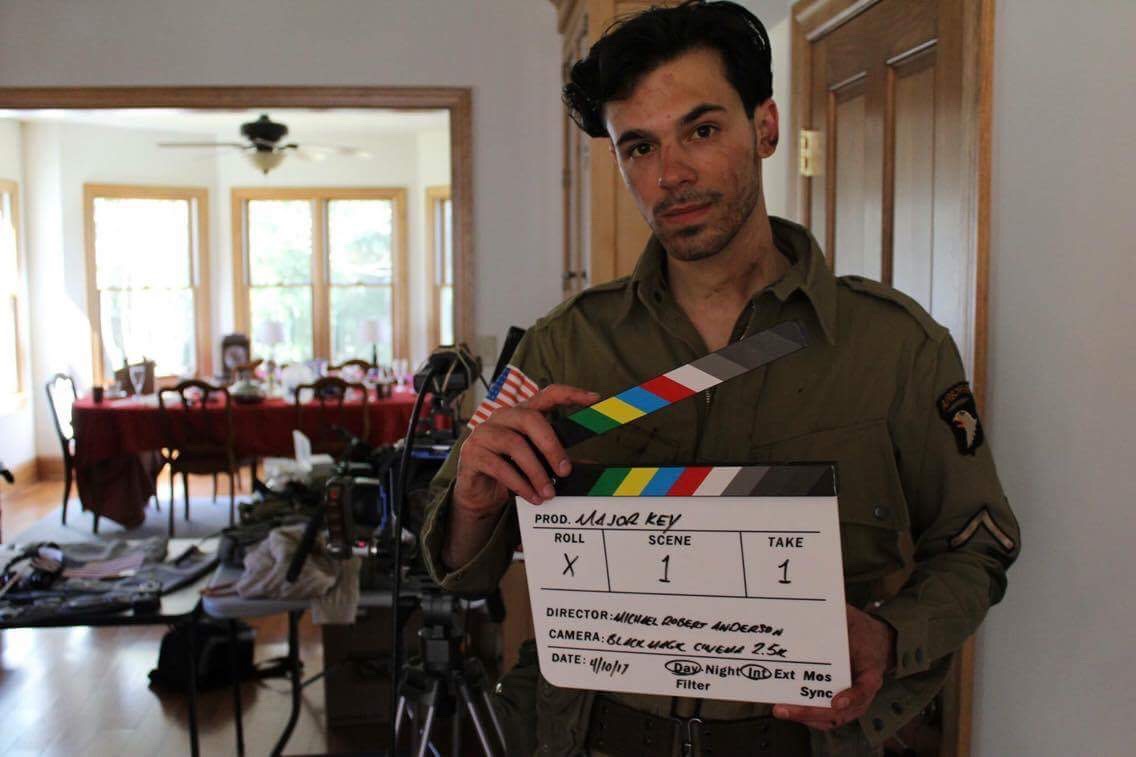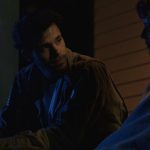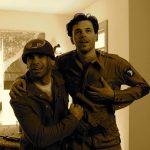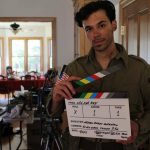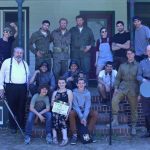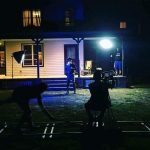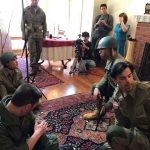Determinedly fighting to complete a meaningful mission and bring their goals to fruition is a powerful theme that’s driving the upcoming short war film, ‘Major Key.’ The second project from writer-director-producer, Michael Robert Anderson, the drama focuses on an American World War II soldier who meets and falls in love with a civilian from the opposing side, and their determination to keep their forbidden feelings alive. The filmmaker, who also stars as the title character in the short, is also courageously and fiercely fighting to overcome the obstacles of making a movie independently, and bring his passion project to the screen.
‘Major Key’ chronicles the formation of a forbidden love in a German village during the height of World War II. A group of soldiers in hiding are taken in by a German family, the Brauhns, which leads to the developing taboo romantic feelings. The daughter in the Brauhn family, Ilse (Sabrina Matarazzo), sparks the interest of one of the American soldiers, John Key.
The duo’s growing attraction is spurred in part by their shared love for jazz music. But John and Ilse must contend with the differences in their overall lifestyles and politics as they ponder whether they can actually form a lasting relationship.
The New York City-based Anderson generously took the time recently to talk about writing, directing, starring in and producing ‘Major Key’ during an exclusive phone interview. Among other things, the actor discussed how he has long wanted to make a World War II movie that focuses on issues, including the trials and tribulations of love, that contemporary audiences can understand. The filmmaker also expressed his appreciation for the dedication of his co-stars and fellow crew members, who diligently worked to bring his emotional vision to the screen.
Anderson began the conversation by describing what his writing process was like while he was developing the script for ‘Major Key.’ He revealed that he initially came up with the idea for the short film “when I was about 11-years-old. I’ve been trying to write a World War II script since I was 11,” the scribe shared with a laugh. “I’ve always been fascinated with this era. My grandfather was in the war.”
While he’s always been intrigued by history, the filmmaker wasn’t interested in penning a story that was similar in nature to ‘Saving Private Ryan’ and ‘Band of Brothers.’ So instead he “wanted to create something that had this idea that’s universal and understood by everybody. So I came to the conclusion that music is universally loved…So I thought, why not create a story with the war as the backdrop, but include a contemporary understanding that during tough times, music can still bring people together?”
Further discussing the musical element of ‘Major Key,’ since John and Isle’s love is driven by their shared love of music, Anderson elaborated on the process of creating the score for the short. “Jazz was the big thing in music in the 1930s and ’40s. I also happen to love jazz music,” the filmmaker shared. He added that during the war, some officials tried to ban jazz music. “That brought another level to writing the film. So not only is this German family protecting these American soldiers, they’re also playing jazz music in a village where they know they’ll get in trouble for it. So I specifically chose jazz music because not only is a part of that generation, but also because for anyone who knew it was banned, there would be an increased intensity for them anytime music was played,” the filmmaker explained.
The scribe then delved into the topic of also directing the short film, and how his writing process influenced his helming style. “This is the second movie that I’ve worked on. The first one was the testing ground for me. So this time around, getting to write, direct and act in the film really helped me think of an overall vision and arc,” Anderson declared.
“Usually when you write a film, you think it’s going to be one thing. But it always turns out to be a completely different vision at the end. You get to the set and see what you’re working with, and also meet your cast and crew. As a result, the vision begins to change,” Anderson revealed. “Directing, for me, was incredible, because the final vision stayed almost the same as the one I had when I was writing the script almost a year ago,” he added.
“So getting to both write and direct the film really informed exactly what I wanted to do,” the filmmaker also divulged. Serving as both the scribe and helmber “helped me figure out the kind of shots I wanted to do…So it was an easier kind of direction” on the set.
Further speaking of setting up the shots, and determining how he visually wanted to tell John and Ilse’s story, Anderson also shared his experience of working with Matt Provenzano, who served as the director of photography on the drama. The two filmmakers are partners at their production company, Purple Cloud Entertainment. “What’s great is that not only are we business partners, but we’re also best friends. So we truly understand each other’s visions,” the helmer noted.
Before Anderson and Provenzano arrived on the set for ‘Major Key’ every day, “I would say to him, ‘Read this scene, and tell me what you think I’m visually looking for here. So we would set at a diner and bounce ideas back and forth about how we wanted to set things up, and what we were both looking for,” the director divulged.
“I was very fortunate, because Matt and I are very similar in our technique for how we like to visually shoot things. So again, that was a smooth understanding. Like any filmmaker and cinematographer, we did also have our differences. But once we found mutual ground, it would come out better than what we both thought about individually,” Anderson also admitted.
The filmmaker then shared why he decided to portray John, in addition to writing and directing ‘Major Key.’ He noted that his college “degree’s actually in acting. I went to The University of the Arts in Philadelphia. (Acting) has always been my goal, and that continues to be my goal. But in this industry, if you can’t find the work, you need to make the work. It’s a fulfilling feeling to be able to make the work. So I decided that since I’m writing and directing this, why not also step into the shoes of an actor?”
Anderson also divulged that when he first considered also starring in ‘Major Key,’ he “felt a little egotistical. I didn’t want to be that guy who’s starring in a film that he also wrote and is directing. But it’s a very fulfilling feeling to know that you put so much passion and energy into creating something, and now you also get to step into that world.”
While that experience was gratifying for the filmmaker, it was also “very difficult at first, because balancing everything is tough. But my crew is so understanding, I had the chance to step away from the production side in order to prep myself for my acting scenes.”
The actor also revealed that portraying the title character in the short was “difficult, because I haven’t fought in any wars.” But he prepared for his performance by “watching a lot of documentaries about wars, especially World War II, and even Vietnam, so that I could understand how people felt at the time.”
Anderson’s preparation as an actor was aided by the fact that “We rented a home in Millville, New Jersey, which was entirely isolated from the rest of the world. Since we were in isolation, that helped me step into the shoes of a soldier, as well as direct the film at the same time. That process was difficult, but also a lot of fun.” Any time that the filmmaker was able to put on his character’s uniform, he “would keep it on the entire day, to make sure that I was staying with the character of John Key. So it was a tough balance, but also very fulfilling.”
Further speaking of creating the looks for the characters, Anderson also spoke about the process of creating the costumes. “I put aside a lot of money for the costumes,” the director disclosed. As far as the characters in the movie, “There are five soldiers and one main German officer, as well as two extras who also played German soldiers. I tried to be as historically accurate as I could when I was looking for their costumes. So I went to surplus stores and ordered clothes online,” the helmer shared. “I then sat in my basement every night, and sewed patches on the clothes. I think they turned out beautifully, and am very glad they came out the way that they did.”
Anderson decided that he wanted the soldiers “to be airborne troops. Once they landed, they were the ones who were really sent into Germany. I don’t know if the audiences will realize that these are the first boys on the ground. They may instead think, those are nice looking costumes, because they’re legitimate pieces from that time, since I ordered things” that were genuine to the World War II era.
“I know the uniforms all kind of look similar, but I wanted the sergeant to look a little different. The color that was used during the war was olive drab, so I put the sergeant in a dark, leafy green, just because I felt like he needed to pop a little bit more,” the director explained. “When people see the film, they’ll understand the sergeant’s position, as opposed to everyone else.
“So everyone has a particular piece on their costume or in their props that defines them in a certain way,” Anderson indicated. For example, the actor’s title character doesn’t carry a rifle, the helmer also revealed. “Also, the best friend of my character is a medic, so I found a medical helmet for him.
The filmmaker added that “With the German soldier, I wrote him with the movie ‘Inglourious Basterds‘ in mind. I thought about Christoph Waltz’s character (Col. Hans Landa) from that movie, because he was so casual, and yet so powerful at the same time. So I wanted to find a costume” for the German soldier in ‘Major Key’ “that really showed that. So I ordered a plain gray suit jacket and other elements separately, and pieced the costume together.”
Anderson also admitted that “I’m most proud of the German soldier’s costume, since that was made from scratch. But I think the overall outcome is going to be received very well. For a low-budget film, a lot went into the production value.”
Further speaking of making ‘Major Key’ independently, in addition to writing, directing and starring in the war drama, Anderson also mentioned how he also served as an executive producer on the short. He initially spoke about the process of raising funds for the film. “As a producer, I don’t entirely believe in Kickstarter or Indiegogo, because I was never confident that anyone was just going to give me money on a project they knew nothing about. It’s a small, independent project, and nobody knows who we are,” he revealed.
“So producing, for me, always came out of pocket. It was difficult to keep putting aside money. I kept going to my wonderful parents, and asked them for any money that they could give me. I also went to the rest of my family, as well as my friends. So I had a very huge support team for this film. Without my family and friends, I wouldn’t have been able to make this film,” Anderson humbly shared. “Everything turned out wonderfully in the end, and I’m happy how things worked out.”
Like the filmmaker previously mentioned, ‘Major Key’ was filmed in Millville. He continued discussing his experience of shooting the short on location in New Jersey. “My best friend, Jessica Davies, was the production team manager” on the film. “So she was the one who really went out of the way to find this home. I couldn’t afford it, as I couldn’t afford to put this movie together at a decent budget,” Anderson divulged.
“But Jessica asked, ‘Why don’t I try Airbnb?’ I didn’t even know what that was at the time, as I’m very behind with everything,” the director admitted with a laugh. “But she found this farmhouse in in Millville on Airbnb. The house was built in the 1800s, and is beautiful. It’s set away from everything else in society, as it’s in the woods,” he also shared.
“So Jessica said, ‘Let’s speak to them, and see what happens.’ She sent the owners an email, and they were ecstatic about us shooting there. They even gave us a nice deal, so it turned out the house was very inexpensive for us to rent for the eight days we were there,” Anderson graciously explained. “Without that house, I don’t think this film would be as good as it is.”
The filmmaker then discussed what the casting process was like for Matarazzo and the rest of the actors who appeared in ‘Major Key.’ “I was very particular when I was finding the cast. There was a look to the people who lived during this time period, whether it was their haircut or their stature and posture,” he pointed out.
“So I held auditions in late January and early February at this little dance studio here on Staten Island, where I live. I thought no one was going to go to the auditions, since we were on Staten Island, and no one likes to make the trip on the ferry here from (Manhattan),” Anderson admitted.
“But it turned out really well. I had a handful of people come in person. I also posted a casting notice on Backstage.com. So I also had a few hundred online auditions that I looked through. It went really well,” the helmer also divulged. “If I felt that someone had the right look, and thought they had potential, I would ask them to record themselves reading a passage I sent them, and then send the tape to me.”
But in the end, Anderson “only cast people who actually came into the auditions. There was something so different about seeing someone perform in person, as opposed to on camera. But that’s not to say that the people who sent in recordings weren’t good, too, because we received some excellent tapes.”
The filmmaker further praised the actors he worked with, saying “I found a wonderful cast. I was so lucky to have gotten one of the actors, because not only does he do well for himself on TV shows and shorts, and is a great performer, but he also speaks German. That was great, because I needed someone who speaks German in the film, in order to improve production value.”
Anderson also admitted that “The female role of Ilse was the hardest part to cast, since she’s the other main character. The way that I wrote the part was that she’s this strong, intelligent woman behind this shy, quiet actress. So it was hard for me to find someone who wasn’t very commanding, or just very shy.”
During the casting process, “My friend Jessica, who found the house, actually told me about Sabrina Matarazzo, and suggested I have her audition. I didn’t think twice about it, and said, ‘Have her send me a video, and we’ll see what happens.’ For her audition video, Sabrina actually read a passage in a German accent, and wore a costume that she thought would be fitting for the time. Sabrina really knocked it out of the park,” the director revealed.
“So up until the time I cast the role of Ilse, I was extremely nervous about putting the rest of the cast together. I didn’t have any confidence that I would be able to cast this lead female character until I saw Sabrina. So the casting process was very difficult, because you want to find the right person,” Anderson also divulged. “But the casting process was also freeing, because I found actors who were really dedicated to the project.”
Once Matarazzo and the rest of the actors were cast in the short, Anderson was able to have some rehearsal time together. The actor-director then spoke about the experience of building the characters’ backstories, emotions and relationships with the rest of the performers. “We had a read-through with the cast at the same dance studio where I held the auditions. We read through the script a few times, and I gave notes. We then tried on some costume pieces,” Anderson shared.
“But leading up to the filming, we didn’t have a chance to meet for rehearsals again. So I would either call or email everyone, and give them break-downs of their characters. At times, I could also be pushy,” the filmmaker admitted with a laugh. “I would tell them to ask me questions, and assure them that I had the time to answer them. But they were so confident in what they were doing that I almost didn’t have to speak with anyone about what they had to do.”
Anderson added that as a helmer, he likes “to sit down with each actor and flush through their character, just to make sure that they were comfortable in what was happening. But I’m not the type of director who likes to tell people how to read a line; I’d rather just steer them in a direction.”
The filmmaker added that he thinks this movie provided a different experience for the rest of the actors. “From my understanding, they hadn’t worked with directors who were also actors before. They had worked with directors who only direct, and that’s their strong point. So it became interesting at times, but it was also fun.”
Anderson added that “being with the rest of the cast in (New) Jersey made it real. My dream from when I was 11-years-old came to life…Once everyone was in their costumes, I thought, this is it. I did something right!”
While the principal photography just wrapped last month, the editing process on ‘Major Key’ has already begun. The actor-director revealed that he’s “not an editor, but I am editing this film, because I couldn’t afford to bring on an editor. But I have a lot of help from my crew as I go along.” The filmmaker added that he recently finished “the first draft of the film, which I’m very happy with. It’s about 20 minutes, so it’s sitting at a very nice short film length.”
Anderson again emphasized that since he’s “not an editor, so I’m not entirely sure what I want to do. But as I sit there for hours on end, and put scenes together, I become more and more proud of the work that I’m seeing. I’m confident that the work on the screen will show how incredible this cast is…But the editing process is going to continue for awhile, because I want to make sure the final draft is as perfect as it can be before the world can see it.”
The director then spoke about how he hopes to release the war drama once the editing is completed. Since his first project, last year’s short film, ‘The Colors of Perception,’ which he also wrote, directed, starred in and produced, “didn’t have a life past Staten Island, I was really upset. So what my goal is for this one is to aim big. I want to aim for Tribeca, Sundance and all of the big festivals, and see all my chances there. I plan on taking the festival route,” he revealed.
“But if the film’s not accepted into the larger festivals, I will submit it to the smaller-scale festivals, and hope for the best. We’ll also have a release here on Staten Island and/or in Manhattan. But I know there are rules and regulations for Tribeca and the other big festivals that require that the screenings be the premiere. So I’m going to hold off on showing the film to the world until I get a response from them,” Anderson explained.
“The goal for this film is to get my cast and production team noticed, and continue to grow as artists and make connections. I’m not looking at Hollywood for this film, or thinking this is going to be the make it or break it project for us. That’s a goal, of course, but to me, that’s not realistic for this movie,” the filmmaker disclosed. “I just want the work to be noticed, and for people to be appreciated for the work they’ve done on this project. So that’s the life after editing-to go the festival route, and then I’ll release it in a few different places.”
